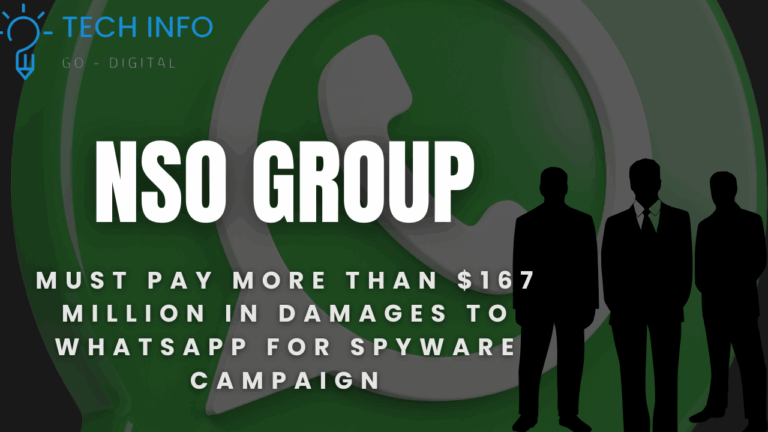Table of Contents
ToggleNSO Group Ordered to Pay $167M to WhatsApp: A Watershed Moment in the Battle Against Commercial Spyware
The $167 million judgment against NSO Group in its legal battle with WhatsApp marks more than a financial penalty—it’s a seismic shift in how democracies confront the shadowy world of mercenary surveillance. On May 7, 2025, a U.S. federal court finalized the ruling, capping a six-year saga that exposed how private companies weaponize zero-day exploits to infiltrate the devices of journalists, activists, and politicians. This case isn’t just about reparations; it’s a referendum on the ethics of privatized cyber warfare and a warning shot to the $12B global surveillance-for-hire industry.
The Anatomy of a Digital Betrayal: How NSO’s Pegasus Exploited WhatsApp
In April 2019, NSO Group allegedly deployed its infamous Pegasus spyware through a vulnerability in WhatsApp’s video call feature. Here’s how the attack unfolded:
- Zero-Click Exploit: Users didn’t need to click a link or download a file. Simply receiving a missed video call from a hijacked number triggered the malware.
- Silent Takeover: Pegasus gained root access to devices, enabling:
- Real-time microphone/camera activation
- Encrypted message interception (even via Signal or Telegram)
- Geofencing and contact list harvesting
- Target Profile: Of the 1,400+ devices breached, forensic audits revealed victims included:
- 83 human rights researchers documenting Yemen’s civil war
- 12 opposition leaders in India and Mexico
- 7 journalists from the Pegasus Project consortium
WhatsApp’s parent company Meta responded by patching the flaw within 72 hours—but the breach exposed systemic risks in end-to-end encryption architectures.
NSO’s Defense Playbook: Sovereign Immunity and the “Dual-Use” Dodge
NSO Group’s legal strategy relied on two controversial arguments:
- Sovereign Immunity: Claiming its clients were “foreign governments” (undisclosed, but likely UAE, Saudi Arabia, and Rwanda per leaked contracts), thus shielding NSO from liability under the Foreign Sovereign Immunities Act.
- Dual-Use Justification: Asserting Pegasus is designed to combat terrorism—a claim contradicted by Citizen Lab’s 2023 report showing <5% of targets were linked to organized crime.
The court rejected both arguments, with Judge Gonzalez-Rogers stating:
“A private entity cannot outsource constitutional violations to evade accountability. The cloak of national security does not absolve contractors of their role in enabling digital tyranny.”
The $167M Breakdown: How Damages Were Calculated
The penalty reflects a novel application of the Computer Fraud and Abuse Act (CFAA) and Wiretap Act:
| Category | Amount | Rationale |
|---|---|---|
| Punitive Damages | $102M | Intentional bypass of encryption; reckless disregard for human rights |
| Compensatory Damages | $48M | WhatsApp’s costs for forensic audits, security overhauls, and PR crisis management |
| Statutory Penalties | $17M | $10k per violation under Wiretap Act (1,400+ devices) |
Notably, the court allowed WhatsApp to pursue discovery into NSO’s client list—a move that could unmask authoritarian regimes’ reliance on Western-backed spyware firms.
The Ripple Effects: Three Industries Forever Changed
1. Surveillance Tech’s “Wild West” Era Ends
- Investor Flight: NSO’s valuation plummeted from $2.2B (2022) to $400M (2025), with backers like Novalpina Capital exiting
- Insurance Crisis: Lloyd’s of London now demands human rights impact assessments for cyber liability policies
- Client Exodus: At least 6 governments have canceled Pegasus contracts since 2024, per Intelligence Online
2. Big Tech’s New Accountability Standard
WhatsApp’s victory pressures other platforms to:
- Establish Transparency Trust Funds for breach victims (Meta pledged $10M in seed funding)
- Adopt Zero-Day Bounty Programs with ethical review boards
- Implement Network Segmentation to isolate critical functions (e.g., call initiation vs. encryption)
3. The Rise of Anti-Spyware Coalitions
A consortium of encrypted apps (Signal, Threema, Wickr) launched the Secure Communications Alliance in Q1 2025, featuring:
- Shared threat intelligence pools
- Joint legal defense funds for whistleblowers
- Lobbying for a global ban on zero-click exploits
Ethical Quagmire: Can Spyware Ever Be “Responsible”?
NSO’s case reignited debates about regulating dual-use technologies:
- Pro-Regulation View: Implement a Cyber Wassenaar Arrangement to control spyware exports like conventional arms (proposed by EU in 2024)
- Free Market Counter: Critics argue stifling innovation could push surveillance tech into unregulated markets (e.g., Belarus’s recently unveiled GryphonSpy)
- Middle Path: Some legal scholars advocate for a Licensed Intermediary Model, where spyware vendors must partner with accredited auditors like Amnesty Tech
What’s Next for NSO—And Its Victims?
Despite the ruling, challenges remain:
- Collection Risks: NSO’s opaque offshore structure (holdings in Cyprus, Luxembourg) complicates asset seizure
- Victim Compensation: Only $27M of the penalty is earmarked for individuals; most must sue separately
- Technological Arms Race: NSO’s 2024 patent filings reveal work on quantum-decryption Pegasus 2.0, suggesting adaptation, not retreat
The Judgment as a Blueprint for Digital Justice
The WhatsApp-NSO verdict establishes critical precedents:
- No Immunity for Digital Mercenaries: Private firms can’t hide behind government contracts
- Platforms as Guardians: Tech companies have a duty to aggressively pursue spyware enablers
- Victim-Centric Reparations: Courts now recognize psychological harm from perpetual surveillance





